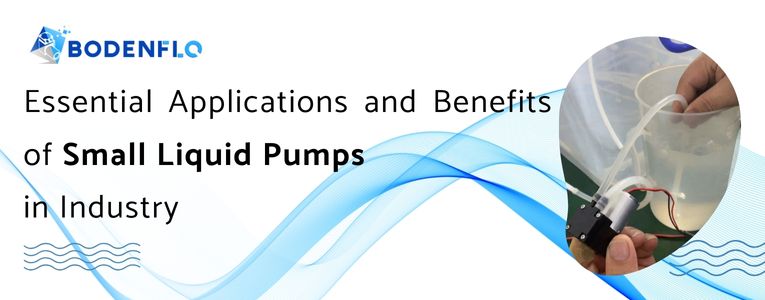
As a project manager with extensive experience in pump technology, I've seen firsthand the transformative impact that small liquid pumps can have across various industrial sectors. These compact yet powerful devices are crucial for ensuring precision, efficiency, and reliability in fluid management systems. In this blog post, I will explore the critical applications and inherent benefits of small liquid pumps within different industries, demonstrating why they are an indispensable tool for modern manufacturing and processing techniques.
What Are Small Liquid Pumps?
Small liquid pumps are designed to handle fluids in low to moderate flow rates with high precision. These pumps are essential in applications where space is limited and accuracy is critical. They come in various types, including diaphragm pumps, gear pumps, and peristaltic pumps, each offering unique benefits depending on the application needs.
Diaphragm Pumps
Diaphragm liquid pumps are particularly valued for their reliability and simplicity. They use a flexible diaphragm that moves back and forth to create a temporary chamber, which draws in and expels liquid through check valves. This design minimizes the risk of contamination, making diaphragm pumps ideal for sterile environments.
Gear Pumps
Gear pumps are known for their ability to pump viscous fluids consistently. These pumps use the meshing of gears to pump the fluid through displacement, and are praised for their durability and efficiency, especially when dealing with thicker liquids.
Peristaltic Pumps
Peristaltic pumps offer the highest level of fluid purity. They work by compressing and releasing a length of hose or tube, pushing the liquid along. This type of pump is perfect for sensitive applications since the fluid only contacts the tube, reducing the risk of contamination.
Small Liquid Pumps: Revolutionizing Fluid Management in Various Industries
Small liquid pumps, often miniaturized to fit seamlessly within various equipment configurations, play a pivotal role in numerous industrial applications. These pumps are designed to handle everything from water and chemicals to oils and viscous fluids, making them versatile tools in any production or manufacturing setting.
Key Industrial Applications of Small Liquid Pumps
- Chemical Processing: In the chemical industry, the precise dosing and transfer of chemicals are crucial. Small liquid pumps ensure accurate handling of corrosive or hazardous chemicals, maintaining safety and integrity throughout the process.
- Food and Beverage: These pumps are used in the food and beverage industry to transfer ingredients, flavorings, and other liquid additives. Their ability to handle food-grade materials without contamination is essential for maintaining product quality and compliance with health regulations.
- Pharmaceuticals: In pharmaceutical manufacturing, small liquid pumps facilitate the precise and sterile transfer of fluids. Their reliability and accuracy are critical for dosing and mixing medicinal fluids without cross-contamination.
- Cosmetics: micro liquid pumps are integral to the production of cosmetics, where they are used for dosing fragrances, oils, and creams. Their precision ensures consistent product quality and packaging.
- Water Treatment: These pumps are also used in water treatment facilities to dose chemicals that treat and purify water, ensuring safe and effective management of water supplies.
- Automotive Fluid Handling: The automotive industry also benefits significantly from the use of small liquid pumps. These pumps are used for tasks such as circulating coolants, lubrication, and dosing precise amounts of adhesives and sealants during assembly processes. The reliability and precise control offered by gear pumps make them ideal for handling the viscous fluids typically found in automotive applications.
- Agricultural: In agriculture, small liquid pumps are used to automate the delivery of water, pesticides, and nutrients to crops. The ability to precisely control the amount of substance delivered helps to maximize yield and reduce waste. Diaphragm pumps are often chosen for these applications due to their durability and ability to handle a variety of chemicals without degradation.
Benefits of Using Small Liquid Pumps
- Precision: Micro liquid pumps offer precise control over flow rates, which is crucial for applications requiring exact fluid volumes.
- Efficiency: These pumps minimize waste and enhance the efficiency of fluid transfer processes, which can lead to cost savings and reduced environmental impact.
- Reliability: Designed to be durable and long-lasting, small liquid pumps can operate under tough industrial conditions, reducing downtime and maintenance costs.
- Adaptability: With their compact size, these pumps can be easily integrated into existing systems, providing flexibility for upgrades and new installations.
How to Selecting the Right DC Small Liquid Pump
When selecting the right small liquid pump, it's essential to consider various factors to ensure you get a device that meets your specific needs effectively. Here’s a comprehensive guide to making the best choice:
Analyze the Fluids
Begin by thoroughly understanding the characteristics of the fluids you need to pump. Factors like viscosity, corrosiveness, and whether the fluid contains solids can significantly influence the choice of pump. For example, gear pumps are excellent for high-viscosity fluids like oils, while diaphragm pumps are better suited for corrosive or abrasive fluids.
Assess the Required Flow Rate and Pressure
Determine the necessary flow rate and pressure to achieve optimal performance in your system. This step will help you narrow down the suitable types of pumps and their sizes.
Consider Environmental and Operational Conditions
Evaluate the environmental conditions such as temperature, humidity, and potential chemical exposures that could affect the pump's material and operation. For example, stainless steel pumps are preferred in corrosive environments found in chemical processing or marine applications.
Evaluate Installation Requirements
Consider the physical space available for the pump installation. Compact and modular pump designs can be advantageous in systems with limited space.
Future-Proofing with Smart Features
Look for pumps with integrated smart technologies, such as sensors and controllers, that enable real-time monitoring and adjustment. These features can significantly enhance the efficiency and lifespan of the pump by preventing dry running and optimizing pump speed according to demand.
Seek Expert Advice
Lastly, consulting with experts or manufacturers like BODENFLO can provide additional insights and recommendations based on extensive industry experience. This can help in making an informed decision that considers all technical and practical aspects of pump selection.
Case Studies: Real-World Applications of Micro Liquid Pumps
Automated Perfume/Oil Filling Machines
In the realm of fragrance and essential oil production, precision and resistance to corrosive materials are paramount. We were approached by a leading manufacturer of automated bottling machinery to integrate a small liquid pump capable of handling these delicate fluids. The challenge was to develop a pump that not only met the 12V and 1.5 liters per minute specifications (BD-04W) but was also resistant to the corrosive nature of perfumes and essential oils.
Our solution was a custom-designed small liquid pump crafted from materials specifically chosen for their compatibility with these substances. This pump now enables high-precision dosing and continuous operation in perfume and essential oil filling lines, significantly enhancing production efficiency and maintaining the integrity of the fluids throughout the process.
Gas Fuel Pumps for Model Engines
Another compelling application of our small liquid pumps is in the model engineering sector, specifically for gas fuel pumps used in model airplanes powered by brands like Saito, OS, and DLE. The specifications demanded a pump capable of delivering at least 300 ml/min, with an input voltage range from 4.8V to 7.4V(BD-02WB).
Our engineering team customized a small liquid pump that not only meets these requirements but also offers consistent performance and reliability, crucial for the optimal functioning of model aircraft engines. This pump is now widely recommended and used across various model engine brands, proving its efficacy and durability in a niche but demanding application.
Conclusion
The integration of small liquid pumps into industrial applications represents a significant advancement in fluid management technologies. At BODENFLO, we continue to innovate and tailor our solutions to meet the diverse needs of industries around the globe. By understanding the specific demands and challenges of our clients, we are able to provide customized, reliable, and efficient pumping solutions.
For more information on how our small liquid pumps can optimize your industrial applications, visit our website or contact us at info@bodenpump.com. Partner with us to enhance your fluid management systems with state-of-the-art technology.


